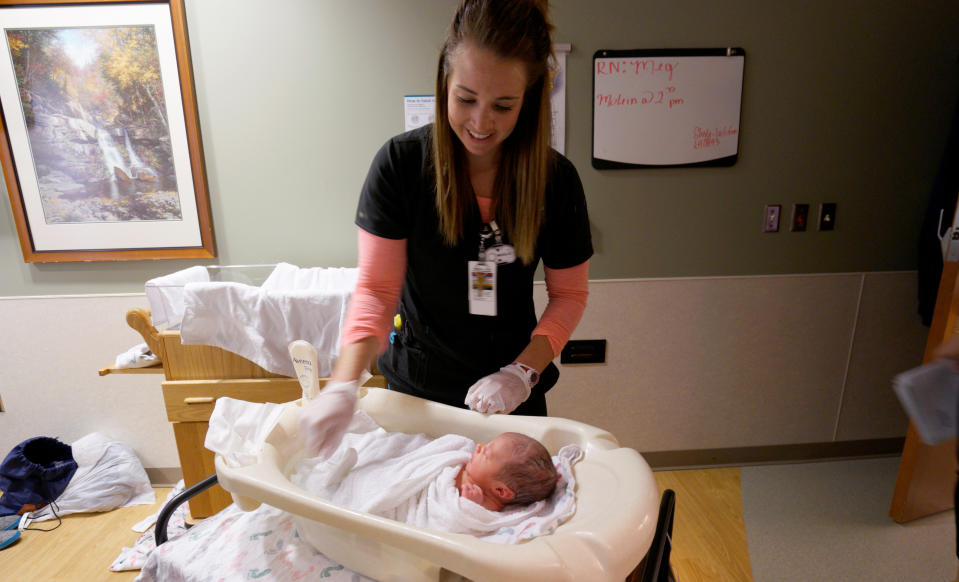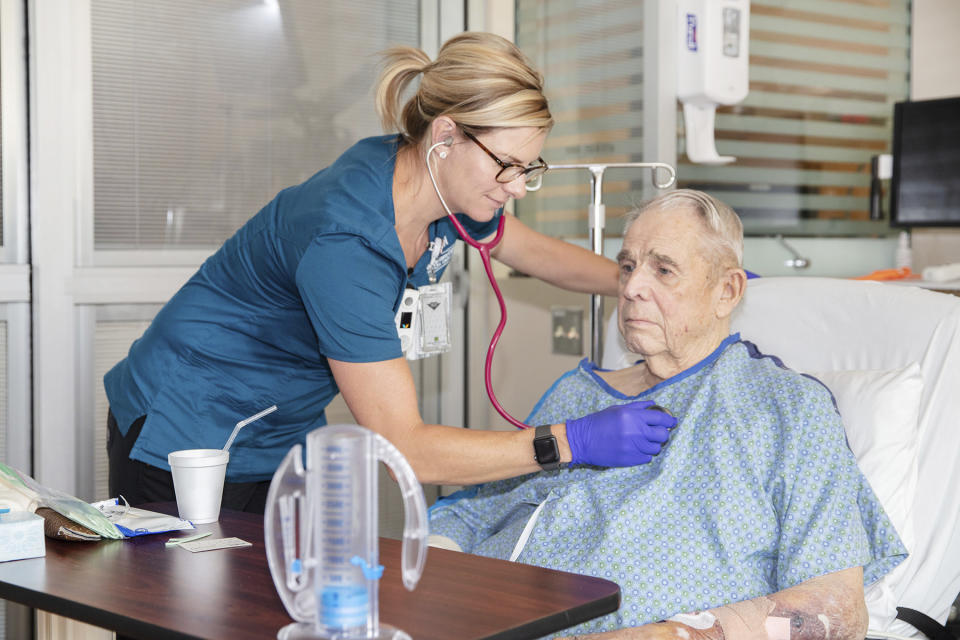Nurses in America 'are experiencing extremely high rates of burnout'
Being a nurse isn’t easy — in fact, more and more nurses are facing increasingly difficult working conditions and are burning out.
According to a recent survey from AMN Healthcare, 22% of nurses hold more than one job as a nurse. And 37% of these nurses say that doing so “negatively affects their quality of life.”
The survey also found that 27% of nurses have witnessed workplace violence, 41% have been victims of bullying, incivility, or any other forms of workplace violence, and 63% of nurses say their organization didn’t address the situation well at all.
“Nurses are experiencing extremely high rates of burnout,” Michelle Mahon, a nursing practice specialist with National Nurses United, told Yahoo Finance. “An alarming rate of nurses experience diagnostic criteria for PTSD. We are seeing an increase in nurse suicide as a result of moral distress.”

A study featured in the Archives of Psychiatric Nursing found that there are higher rates of suicide among those working in nursing compared to non-nurses. It also showed that nurses are “statistically significantly more likely to have reported mental health problems,” although it’s unclear whether or not their work environment plays a direct role in those figures.
In the AMN survey, 66% of nurses said that they worry their job is affecting their health.
“This is moral injury,” Mahon said. “They spent all these years in school, and they’re getting into an environment where basically they’re providing factory-level care. It feels like it’s so dehumanized.”
A shortage — of sorts
About 52% of nurses believe that the nurse shortage in the U.S. has grown worse over the last five years, despite the fact that there are nearly 3 million registered nurses in America and the profession is still one of the fastest-growing in the country. Part of this is due to the post-recession economic expansion, which has led to new jobs and more money for consumers to spend on health care, leading to a demand in services.
“It’s a shortage of nurses who are willing to work in the conditions,” Mahon said when asked about a potential shortage.

Cole Edmonson, a doctorally-prepared nurse and chief clinical officer at AMN Healthcare, pointed to the distribution of nurses across the industry.
“If you look at the number of licensed nurses, there is not a shortage,” he said. “But you have to look at where those nurses are practicing, why they choose to practice in those area or leave those areas of practice.”
In any case, nurses are going to be needed more than ever before as more Baby Boomers retire from the profession. According to the survey, the number of Baby Boomer nurses peaked at 1.26 million in 2008, and since 2012, approximately 60,000 nurses have been retiring each year.
The survey found that 20% of nurses are planning to retire in the next five years, and 86% of Baby Boomer nurses say they will be retiring in that time span.
Mahon said “there’s been a lot of preparation” for that over the last few years, “in anticipation of the exodus of many nurses from the workforce but also in preparation for having to care for them as a society.”

Less time with patients
Mahon asserted that the so-called shortage a crisis manufactured by the industry, which “has been using it to pivot to their technological restructuring … to really capitalize upon the economies of scale that come with [it].”
Edmonson said that the industry has “to be able to get better at” using technology in ways that benefit nurses.
“So many hospitals and health systems have set up roles that are very flexible in terms of hours worked, the role that nurse may play as a mentor or preceptor, as opposed to being direct hands-on-care,” he said. “They’re also very, very creative around utilizing those nurses now to be more in a tele-health setting, to be able to support virtually as well as in person or for patients and also other nurses through different types of nurse consultant services.”
Amid these industry changes, nurses feel like they can’t provide the same level of quality care as they used to. In the AMN survey, 44% of nurses said they don’t usually have the time they need to spend with their patients.
Adriana is an associate editor for Yahoo Finance. Follow her on Twitter @adrianambells.
READ MORE:
The states where Americans are — and aren't — getting vaccinated
The U.S. opioid crisis will cost $800 billion over last five years, study says
What is direct primary care? 'Think of a combination of Netflix and Costco'
Read the latest financial and business news from Yahoo Finance
Follow Yahoo Finance on Twitter, Facebook, Instagram, Flipboard, SmartNews, LinkedIn, YouTube, and reddit.

 money
money 
